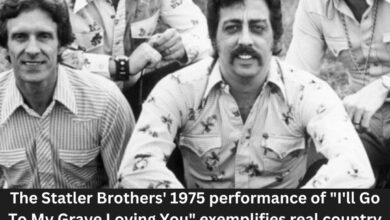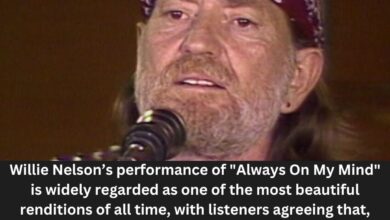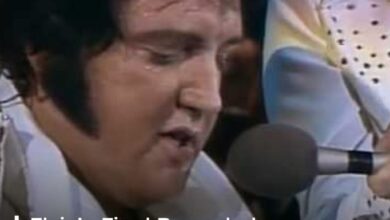In 1978, Waylon Jennings And Johnny Cash Released A Song Titled “There Ain’t No Good Chain Gang”
The song “There Ain’t No Good Chain Gang” emerges from a profound cultural tapestry woven by its two legendary performers, Waylon Jennings and Johnny Cash. Both artists are emblematic of the Outlaw Country movement, which championed a more authentic, gritty sound that opposed the polished mainstream Nashville style of the time. This musical rebellion fostered a new narrative landscape in country music, often exploring themes related to societal outcasts, personal struggles, and the harsh realities of life. Their association in this song is not merely a confluence of their talents, but rather a historical moment that illustrates the shifts within the genre and the storytelling abilities intrinsic to its essence.
Waylon Jennings, born in 1937 in Littlefield, Texas, began his career as a radio DJ and later became a pivotal figure in country music. His signature sound, characterized by a blending of rock, honky-tonk, and folk influences, resonates through his extensive discography. Jennings was known for his rugged persona and reflective lyrics, often centered on themes of love, loss, and redemption. His life experiences—marked by struggles with addiction, personal relationships, and career challenges—informed his songwriting, making his music deeply relatable.
Johnny Cash, often referred to as “The Man in Black,” emerged from humble beginnings in Kingsland, Arkansas. His unique blend of country, rock, and folk music, coupled with deep, resonant vocals, earned him a place as one of the most influential artists in American music history. Cash’s iconic tracks frequently tackled themes of prison life, moral dilemmas, and the human condition, such as in his famous songs “Folsom Prison Blues” and “Man in Black.” His artistic and personal struggles with faith, fame, and his turbulent life experiences drew audiences to his music, allowing listeners to confront their own fears and desires through his lyrical honesty.
The song itself, with its vivid narrative, paints a somber picture of life as part of a laboring chain gang. The lyrics convey a critical perspective on the penal system, stirring emotions related to despair and hopelessness. It serves as a poignant admonition against the choices that lead individuals down a path of incarceration. By shining a light on neglected societal issues, Jennings and Cash challenge listeners to reflect on justice, morality, and human dignity. This ability to blend personal stories with broader societal commentary is part of what makes country music compelling and deeply resonant.
Notably, the collaboration between Jennings and Cash was a testament to their friendship and mutual admiration. Both artists experienced toils and trials, forging a bond that transcended the typical artist partnerships. While their individual styles and personal histories might differ, the shared understanding of struggle and perseverance united them in their music. The chemistry evident in “There Ain’t No Good Chain Gang” is representative of the respect they held for one another as artists, and it brought forth a raw energy that captivated audiences.
In terms of commercial success, “There Ain’t No Good Chain Gang” struck a chord with fans upon its release. The convergence of Jennings’ and Cash’s star power contributed to its ability to soar on the charts, reaching the pinnacle of country music popularity. Fans craved authenticity in their music, and while both artists had their distinct sounds, their collaboration echoed with a shared ethos that resonated deeply with audiences of the time. This song became part of the larger narrative they were crafting in their respective careers.
The legacy of this collaboration extends beyond its chart performance. It solidified Jennings’ and Cash’s status as icons of the Outlaw Country movement, and their work continually influences new generations of musicians. Contemporary country artists often draw inspiration from the rawness and emotional truth found in Jennings’ and Cash’s music. The ability to convey poignant stories through song remains a defining characteristic of the genre, allowing it to evolve while maintaining its roots.
Moreover, “There Ain’t No Good Chain Gang” remains relevant today, as conversations around criminal justice reform and the experiences of incarcerated individuals continue to resonate in societal discourse. The themes established in the song encourage ongoing discussions about personal responsibility, societal failure, and the quest for redemption. In this way, the song not only serves as a piece of musical history but also a catalyst for reflection on the contemporary challenges surrounding these issues.
In summary, “There Ain’t No Good Chain Gang” stands as a powerful testament to the collaborative spirit of Jennings and Cash, reflecting their respective journeys and the ongoing struggles faced by many. Their artistry transcends time, inviting listeners to engage with the deeper implications of life, freedom, and the human experience. As both artists continue to influence the trajectory of country music, their legacies remain intertwined, celebrated through this unforgettable song and the stories it tells. The richness of their experiences blends seamlessly into the fabric of the narrative, creating a lasting impact that defines the essence of country music: its ability to narrate the complexities of life with honesty, integrity, and heartfelt emotion.





